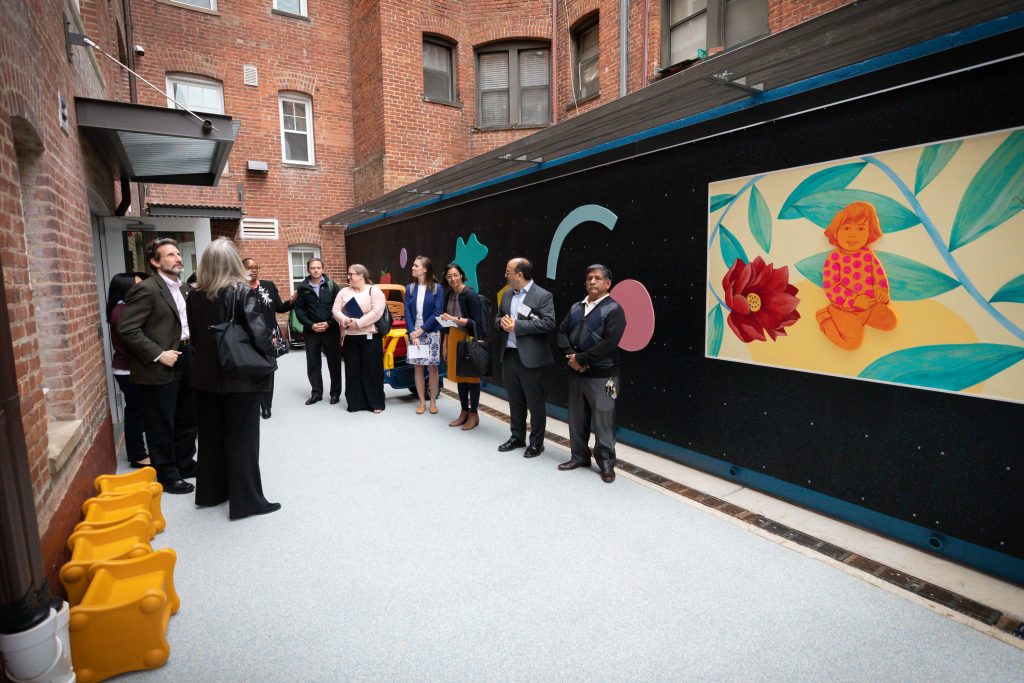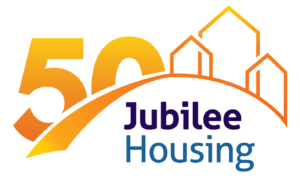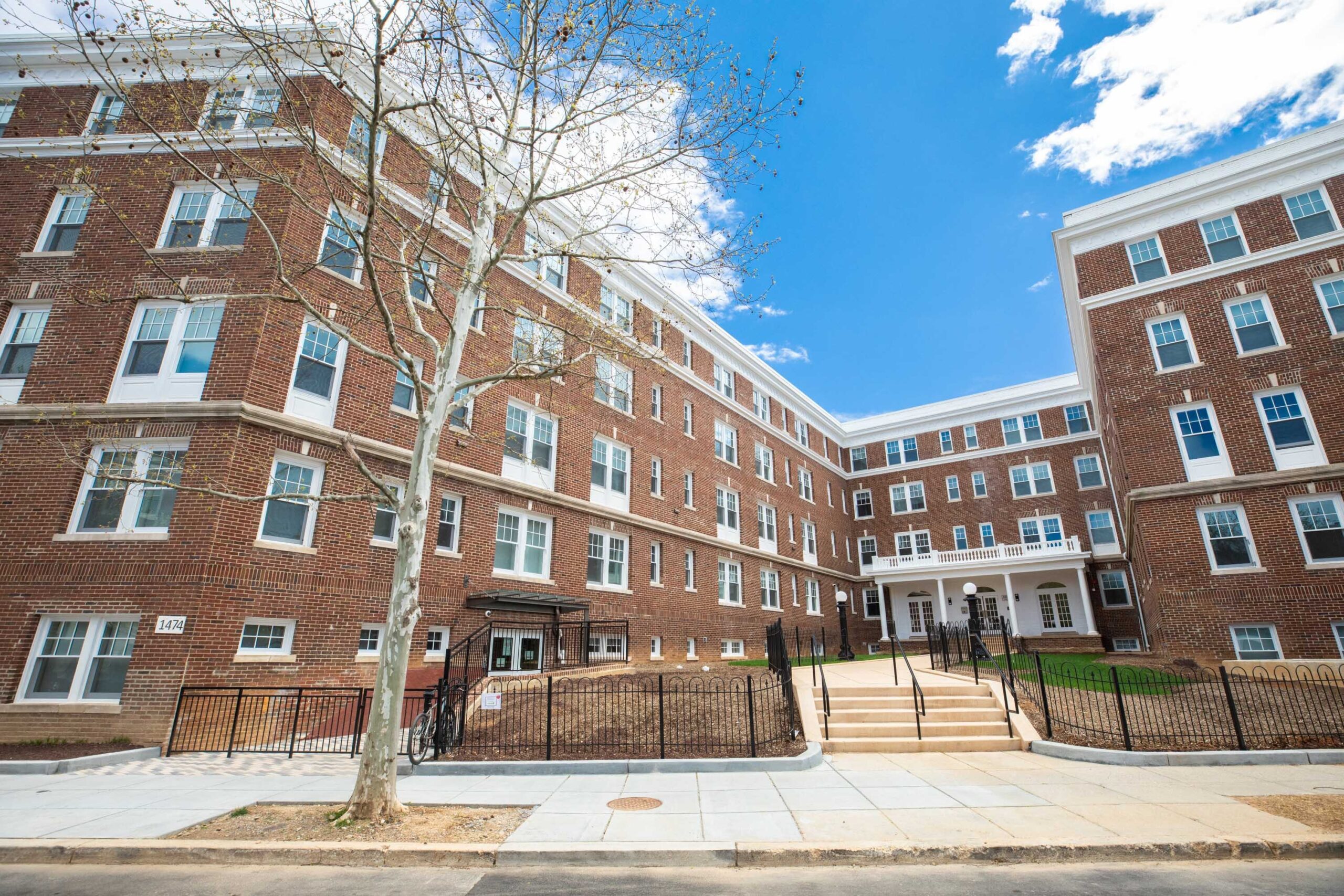This year is the 5-year anniversary of the opening of The Maycroft, part of Jubilee’s 50-year arc of justice efforts. As we celebrate this milestone, we reflect on the power of persistence, partnership, and innovation surrounding the completion of The Maycroft, which catalyzed Jubilee to understand its work as Justice Housing®.
50th Anniversary Stories
The Maycroft: Persevering to Preserve Affordable Housing
In 2010, in the heart of Washington, DC’s Columbia Heights neighborhood stood The Maycroft. Many of the units were vacant; the previous building owner had been exploring a conversion to market-rate condominiums and had not refilled them as tenants moved out. A small but dedicated group of 18 households remained.
Meanwhile, Jubilee Housing was embarking on extensive renovations of several of its existing buildings in Adams Morgan. The Euclid and The Sorrento both needed complete gut renovations that would require the temporary relocation of tenants, so Jubilee was actively seeking a nearby building with enough vacancies to support the project.
A fortuitous connection led to The Maycroft. Former property manager Elizabeth McIntyre made contact with the Maycroft owner and opened the door for a simple arrangement: Jubilee’s residents would occupy the vacant units during the construction period, and then move back into their renovated homes.
But Jim Knight, Jubilee’s CEO then and now, had an idea: What if we bought the building, renovated it, maintained it as affordable housing, and added onsite services?
Euclid and Sorrento residents returned to their homes, and Jubilee expressed interest in purchasing The Maycroft. Under DC’s Tenant Opportunity to Purchase Act (TOPA), any time a building with five or more units goes up for sale, tenants have a right to organize and purchase the building or assign their right of purchase to a partner.
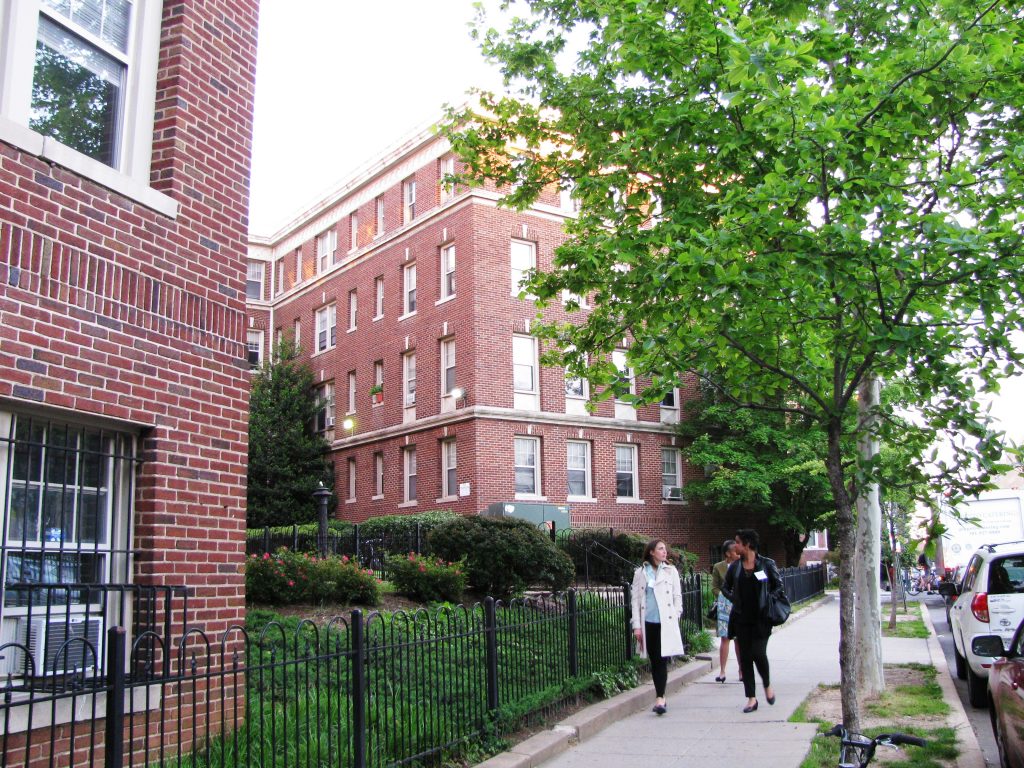
”Because we were interested in buying the building, we explained to the tenants that we would renovate the building similar to our other buildings and ensure deep affordability for all of the tenants. The tenants organized an association, executed an agreement with Jubilee, and assigned their right of purchase to Jubilee,” explains Marty Mellett, Jubilee’s former Vice President of External Affairs who helped lead the process.
After securing initial financing to purchase the building, Jubilee’s next goal was to secure funds for its extensive renovation of 64 deeply affordable housing units, complete with onsite services. Jubilee successfully obtained renovation financing from several sources, including DC’s Housing Production Trust Fund.
Additionally, the organization needed to refinance because the seller’s financing agreement with Jubilee Housing was expiring. Doing so triggered a second TOPA process, and once again, the tenant association voted for a second time to transfer their purchase rights to Jubilee.
But there was one more step. The project would need to utilize federal Low Income Housing Tax Credits (LIHTC) to ensure units remained affordable at the level needed for these residents and newcomers to the building. This final stage of utilizing LIHTC required Jubilee to transfer the ownership of the building to a new Jubilee-controlled legal entity. In effect, this was a transfer from one Jubilee hand to another — a standard practice in the affordable housing industry when using LIHTC. This change of ownership triggered one final TOPA process, and once again, Jubilee gave notice to the tenant association of the change. Since the tenants had already assigned their rights two times, the tenants decided not to formally assign their rights and allow the transaction to move forward as proposed.
Unfortunately, that was the moment another actor intervened, establishing a bogus tenant association and falsifying its registration. They “sold” the bogus purchase rights to a market-rate developer who then sued Jubilee to take away the property. The lawsuit stalled the final steps needed to close on financing and proceed to the renovation of the building.
What came next was two and a half years of litigation and Jubilee’s fight to keep the property from being turned into market-rate housing. Each time the case went before a judge, the judge ruled in Jubilee’s favor, but the outside developer would appeal.
But out of this struggle emerged a story of the incredible strength of community partnership, as well as Jubilee’s sense of its work as creating Justice Housing.
Jubilee was managing the building with a substantial acquisition loan and navigating the challenge of maintaining a property in disrepair, and persisted with the essential support of partners and community advocates – all heroes and heroines of this saga:
The Latino Economic Development Center (LEDC) worked with residents to ensure the legitimate tenant organization stayed organized and continued to reflect more than 51% of the residents remaining in the building.
The law firm DLA Piper learned what was happening and offered to represent Jubilee in the litigation pro bono. “We described what was happening and they said ‘this is worth it,’” says Marty.
The Local Initiatives Support Corporation (LISC), helmed at the time by community leader Oramenta Newsome, lent Jubilee a million-dollar unsecured line of credit despite the risk, putting faith in Jubilee’s ability to overcome the challenge and complete the project.
Arnold and Porter law firm assisted the process by representing the initial tenant association and successfully challenged the legitimacy of the rival tenant association before the Department of Housing and Community Development.
The DC government, acting through the Department of Housing and Community Development, extended a loan that enabled Jubilee to repay foundations and individuals who had pitched in to help, including Elizabeth McIntyre, who made a generous gift from her estate.
“We had this building that was falling apart, and we had residents, including elderly people living in it,” says Marty. “We were bleeding money trying to fix things like the boiler going out — and our funders and partners stuck with us, ensuring that Jubilee and tenants would make it to the finish line.”
Eventually, with the litigation finally concluded, the renovations began. There were plenty of challenges to be found behind the walls of the older building, but slowly, the vision for new Justice Housing came to life.
The project broke ground in 2017. In 2019, Jubilee Housing’s Maycroft apartments opened to welcome returning and new tenants.
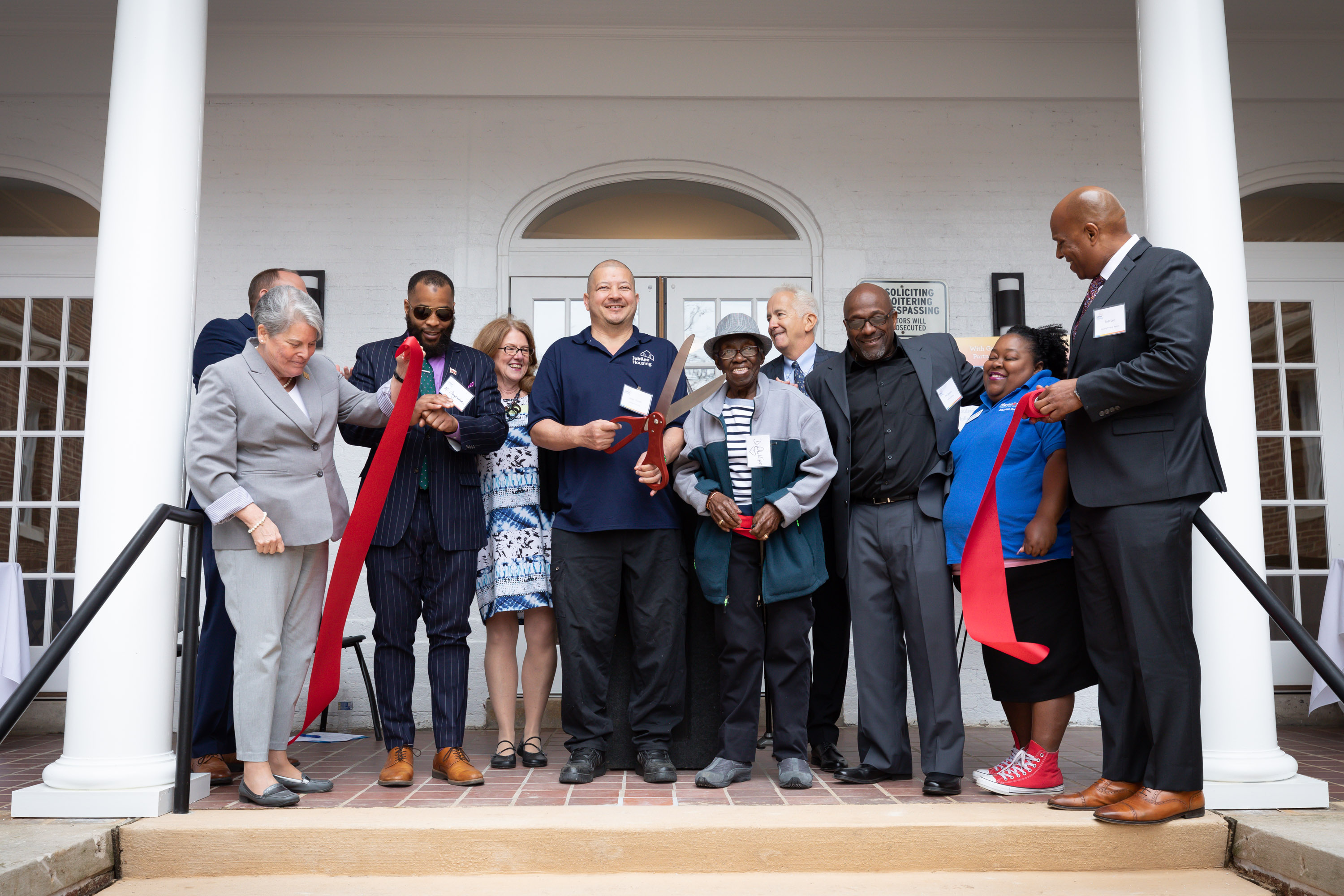
Today, The Maycroft provides residential housing that uses Low Income Housing Tax Credits to keep rents deeply affordable, with a focus on affordability for families making 30 percent or less of the area median income.
The ground floor hosts partner Martha’s Table, which operates three critical programs: an early childhood learning center for up to 47 students, a no-cost healthy food market, and a meal delivery program for those experiencing housing instability.
Jubilee also opened its renewed Teen Center, which provides out-of-school time support focusing on college and career prep for youth ages 13 and up. This includes administering the Jubilee to College program, which awards last-gap scholarships and ongoing mentorship for students pursuing higher education or career training.
Lastly, a unique collaboration with New Partners Community Solar, DC’s Solar for All program, and PEPCO unites housing justice with environmental justice. Rooftop solar panels provide energy discounts directly to residents and power an innovative Resiliency Center.
But the impact of The Maycroft is not confined to the building alone. The process of fighting to bring the vision for The Maycroft to fruition encouraged Jubilee Housing to better define its mission, giving birth to the idea of Justice Housing.
“The ordeal challenged us to understand our work as a justice response,” says Jim Knight, Jubilee President and CEO. “Preserving inclusion in high-opportunity neighborhoods through deep affordability and onsite services — those characteristics were already part of our buildings, but the struggle for The Maycroft pushed us to understand that as our particular model for creating justice through housing. That was the beginning of us defining our work as Justice Housing.”
The Maycroft also catalyzed Jubilee’s sense of need to create more Justice Housing. Recognizing that the Columbia Heights and Mount Pleasant neighborhoods were only becoming more competitive real estate markets, Jubilee Housing launched two Justice Housing Partners Funds that enable the nonprofit organization to better compete against market forces. In 2024, Jubilee is approaching the expected completion of two buildings in the EucKal Project, which includes a second building acquired through TOPA. Next year, renovations are expected to start on three more buildings in the Mount Pleasant Preservation Project, all of which were acquired through TOPA.
For people like Samuel Buggs, a Maycroft resident for more than 12 years and a member of Jubilee’s Board of Directors, the Jubilee community has been transformative.
“What makes Jubilee special? I wish I had an idea. I would like to believe it’s all the things that Jubilee encompasses, all the things that make Jubilee what it is. That feeling, I believe, also trickles down to the residents. Most of the people are cordial with each other. We aid each other when we are able to. And that’s what real community is about. It’s not ‘I look different than you do,’ or ‘you have more money than I do.’ I think Jubilee’s residents are some of the best residents, and I have lived in a few places throughout this city. It’s just the best community of residents I’ve been involved in.”
